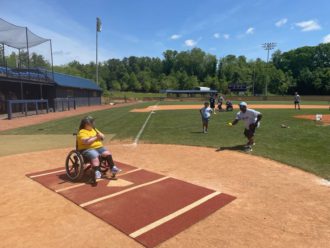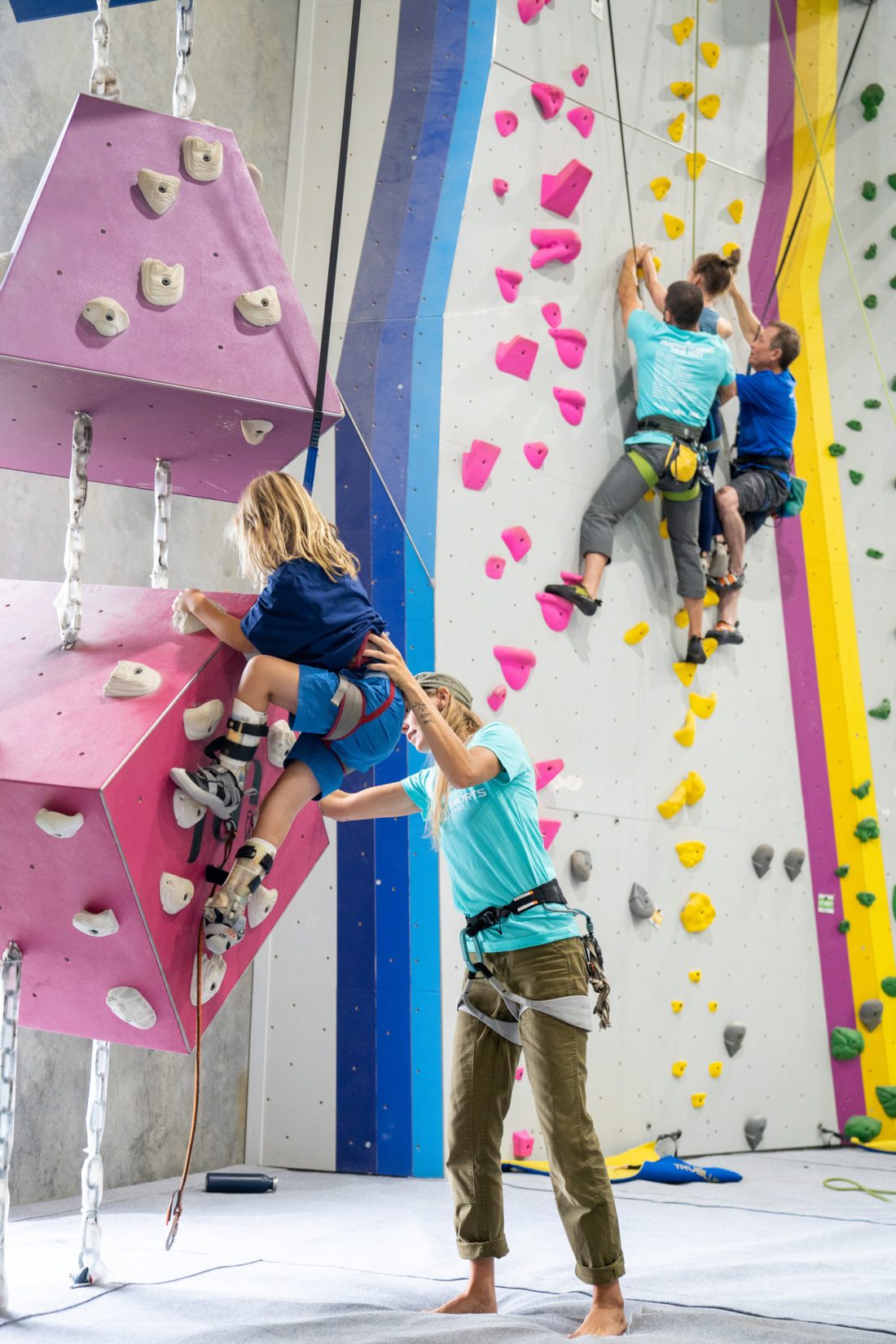The rock walls at The Riveter in Fletcher are a daunting mosaic of challenging holds. For any climber, they require agile footing and sheer determination to reach the next step on the route to the top. But this is especially true for athletes who need extra support or individual modifications to accommodate a disability as they ascend.
Adaptive sports (also known as parasports) are competitive or fitness activities that utilize alterations of able-bodied rules and unique equipment to create an equitable playing field for people with disabilities. For youths who might be introduced to a sport for the first time, a number of adaptive sports programs in Asheville can help encourage those with different abilities.
Noel Russell, 13, of South Asheville discovered adaptive climbing two years ago at the Reuter Family YMCA, which has a climbing wall. Noel was born in China and is deaf; she also has severe cognitive delays from her early years. Part of her occupational therapy has included climbing, says her father, Marc Russell.
Noel attends the Riveter’s monthly Adaptive Sends indoor climbing events sponsored by the Asheville chapter of Catalyst Sports, a nonprofit that serves people living with physical disabilities in the Southeast. She’s also active on the Special Olympics Buncombe County’s gymnastics and swim teams. She one day hopes to climb Mount Everest, like her heroes Scott Lehmann and Shayna Unger. (Unger was the first deaf woman in the world, and Lehmann was the first Deaf American, to summit in 2023.)
Both Catalyst Sports and Special Olympics Buncombe County offer volunteer training and lend specifically designed apparatus, such as handcycles. The equipment allows participants with a range of physical or intellectual differences to explore their interests with a fun, therapeutic intention rather than a competitive focus.
Adaptive sports for youths are also important for their parents. “We need each other,” says Stacie Hildenbrand of Mills River. “Representation is something we advocate for for our own children. Together, we can problem-solve and create opportunities that don’t exist yet.” Her daughter Layla, 13, has been blind since birth, due to a condition called leber congenital amaurosis. Layla is a climber, says her mom, explaining that “lack of sight is her only limitation but that does not slow her down.”
Lori Long, Asheville Parks and Recreation’s therapeutic recreation coordinator, says “99% of our participants are autistic or diagnosed with a developmental disability, but we don’t omit any child from our rosters because they don’t have a documented diagnosis.” She says the program can tailor opportunities to each child’s needs. For example, some sports build on behavior management plans provided by a service provider or school. Caregivers are welcome to participate alongside the athletes.
“Our approach is to give everyone the opportunity to play at their own pace,” says Kelly Sullivan, Asheville Parks and Recreation therapeutic recreation program leader. “We have a baseball program because we want participants to know what it feels like to swing at a ball in front of a crowd.” The therapeutic recreation department recently wrapped up winter basketball and is opening registration for upcoming hiking trips, a summer camp and its baseball program — all of which are adaptive for youths.
At the Riveter, a suspension system consisting of a chest harness and pull-up bar gives climbers who don’t have use of their lower extremities more control. But Adaptive Sends volunteer Acacia Houle notes that any climber who is more comfortable seated can use that adaptation.
“Even able-bodied climbers climb the same route in very different ways, so [the sport] really lends itself to adaptive participants,” she says.
From clinics to the courts
In addition to climbing, tennis is another popular adaptive sport for youths in Asheville.
On Saturdays in the spring and fall, an Omni Grove Park Inn tennis pro leads an adaptive sports clinic for children as well as adults. They practice groundstrokes, volleys and overheads in a low-stakes setting. The Asheville Tennis Association partners with Abilities Tennis of North Carolina to sponsor the program; sessions are free. (Abilities Tennis of North Carolina also sponsors skills clinics in Hendersonville, one of its 32 statewide locations.)
Leslie Grotenhuis brings her son Oliver, who has Down syndrome and attends Asheville High School, to the Omni Grove Park Inn courts. “Players don’t get frustrated, because the way it is set up is a fun way to play the game,” she says. “Plus, he makes friends.”
Using the U.S. Tennis Association’s fundamental format for youths under 10 years old helps kids in the adaptive program set achievable goals. Much like the Special Olympics, short- and full-court tournaments are structured so athletes compete with others of similar ability. This year’s round-robin competition will be held locally at Lake Junaluska on Saturday, June 15.
Another program called Wheel Serve, which is based out of Charlotte, has been made possible by the Asheville Tennis Association at the Asheville Racquet Club since 2021. Past Asheville Tennis Association President Debbie Southern says the group was able to purchase sport wheelchairs — four for adults and one for a child, thanks to a $5,000 grant from Mission Hospital.
‘How can we modify it?’
Parents, health care and recreational professionals can confer on how to make sports more adaptive.
For example, Jenna Dowers, 13, of Candler, has spina bifida; her orthopedic doctor suggested incorporating climbing into her physical therapy options. Her mother, Robyn Dowers, says sports has changed her perspective on what her daughter can and can’t do. “I now look at a sport to see how can we modify it,” Robyn says.
To help schools and communities build more inclusive spaces, the nonprofit Move United (formerly Disabled Sports USA) offers online materials that provide guidance on policy and athlete engagement. Learning manuals include those on risk reduction, lesson plans for educators and recommended ways

to reach out to diverse communities based on nationally available and state-specific demographics.
Sullivan points out that not all adaptive activities require specific indoor facilities or extensive planning. For some activities, it’s only a matter of getting outside. Adaptive trails around Asheville that Parks and Recreation uses include Bill Moore Community Park, Moore Cove Falls and Laurel River Trail.
The payoff for kids in adaptive sports is tremendous, says Dani Felix, a volunteer with the Abilities tennis clinics. She found out about adaptive sports when she helped with a Parks and Recreation summer camp. “[Therapeutic Recreation] changed my relationship with sports,” says Felix. “I was made fun of as a kid; instead, as an adult, I’m learning that no one is going to judge me if I can’t run or catch a ball.”
She adds, “It’s made sports fun in a way it never was before.”
Belonging on the bases
For more than a decade, Asheville Parks and Recreation has worked with T.C. Roberson High School’s baseball team, the Rams, to host an adaptive league. A majority of its participants are a part of Buncombe County Schools’ Progressive Education Program serving approximately 150 students with moderate to severe physical and intellectual disabilities. Sign-ups are open to the public, too, and prior to the COVID pandemic, baseball seasons had 70-80 players, Long says.
Working with an established team eliminates a common barrier within adaptive sports of whether there are enough buddies to pair one-on-one with kids, she continues. Some programs, like swimming and archery, even pair kids up on a three-on-one basis to maintain a safe, encouraging environment.
For eight weeks on the Holmes-Smith field at Roberson High School, Rams players mentor and befriend their special needs peers. Before every home game, a PEP student throws out the first pitch, then watches from the dugout.
Eric Filipek, head coach for the Roberson Rams baseball team, says kids in the PEP program “bring joy to our journey as a team.”
He continues, “The smiles on their faces are immeasurable. The interactions give us motivation and keep our players’ feet on the ground.”
Editor’s note: The author is a freelance journalist and former volunteer with Catalyst Sports, Asheville.



Before you comment
The comments section is here to provide a platform for civil dialogue on the issues we face together as a local community. Xpress is committed to offering this platform for all voices, but when the tone of the discussion gets nasty or strays off topic, we believe many people choose not to participate. Xpress editors are determined to moderate comments to ensure a constructive interchange is maintained. All comments judged not to be in keeping with the spirit of civil discourse will be removed and repeat violators will be banned. See here for our terms of service. Thank you for being part of this effort to promote respectful discussion.